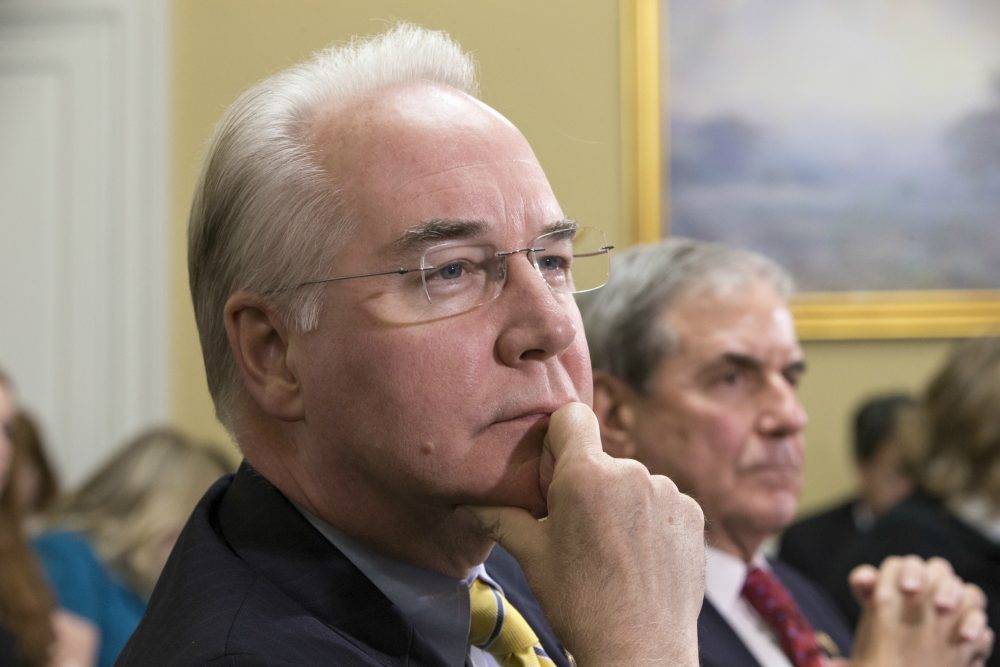Advertisement
Tom Price, And The Cost Of Repealing The Affordable Care Act

COMMENTARY
Congress has staged scores of futile votes to "repeal and replace" Obamacare, as the Republican mantra has it. Typically, the "replace" part has been an asterisk, as in we'll get back to you on that. That’s because deep-sixing the law, while retaining popular parts like the mandate that even sick people get coverage, is impossible, unless either the government pays all medical bills or you have a private-public system like, um, Obamacare. Bowing to that difficulty, some leading Republicans even support “repeal and delay:” an immediate repeal vote that phases out the law gradually, playing for time to find the impossible dream of a workable replacement.
So give Rep. Tom Price, R-Ga., credit. Donald Trump's pick for health and human services secretary has hawked a detailed plan for years on how to replace the Affordable Care Act. While others in his party must answer the question, “Replace with what?” the question for Price is, “Would your replacement work?”
Price’s Empowering Patients First Act, its highfalutin name notwithstanding, wouldn’t solve the fundamental math of health care.
In case you haven’t guessed, it wouldn't.
Price’s Empowering Patients First Act, its highfalutin name notwithstanding, wouldn’t solve the fundamental math of health care: If you want to insure every American (as you should), then you have to require every American, including healthy ones, to buy insurance; that way, the high medical costs of the sick can be spread among a large population. And if you’re going to require everyone to have coverage, government has to provide subsidies to the poor who would find that mandate onerous or impossible. Voilà: You have Obamacare.
Price’s bill would ban both coverage denial and higher premiums for people with pre-existing conditions, but only if they hadn’t had a lapse in their insurance during the previous 18 months. “This means that insurers would not be required to sell an affordable plan to anyone who did not have coverage for, say, a month while he or she was between jobs,” The New York Times editorial board explained.
Price’s Act would scrap the mandate that everyone have insurance. It would abolish subsidies to states to expand Medicaid for the poor and instead send them fixed “block” grants that would give them more authority over Medicaid but also slash spending.
So how would Empowering Patients First cover the 20 million uninsured who got coverage through Obamacare? By doling out tax credits for buying individual and family insurance plans (credits start at $1,200 and increase as people age), and by offering states subsidies to create high-risk pools to cover those with pre-existing conditions. (Smaller-bore, Price also would legislate incentives for health care savings accounts, which can be used for out-of-pocket medical expenses.)
Even analysts partial to some of Price’s aims say this defies the math of health insurance mentioned above. That’s not just theorizing: Long before Obamacare, several states experimented with high-risk pools. All flopped because, as the chairman of Texas’s said, they omitted a foolproof mandate that everyone buy insurance. That left the states holding the unaffordable bag for sick people.
There are two ways to solve that problem, the chastened-by-experience Texan argued: a “public option,” or health plan, to compete with private insurers and goad them into providing quality, affordable coverage, or the Obamacare route of extensive restrictions on insurers. Easing those restrictions now, as Price proposes, won’t repeal the laws of math. It will merely reenact past blunders.
For all the improvements Obamacare needs, critics refuse to concede the good the law achieved.
But Price is a surgeon, and history clearly isn’t his strong suit. For all the improvements Obamacare needs, critics refuse to concede the good the law achieved: the lowest rate of uninsured Americans on record, a dramatic increase in the number of people who can pay off medical bills.
Trump’s designated health care overlord deserves a high grade for boldly going into detail where no Obamacare grouse has gone before. But the replacement ship he’s piloting can only end in a crash.
